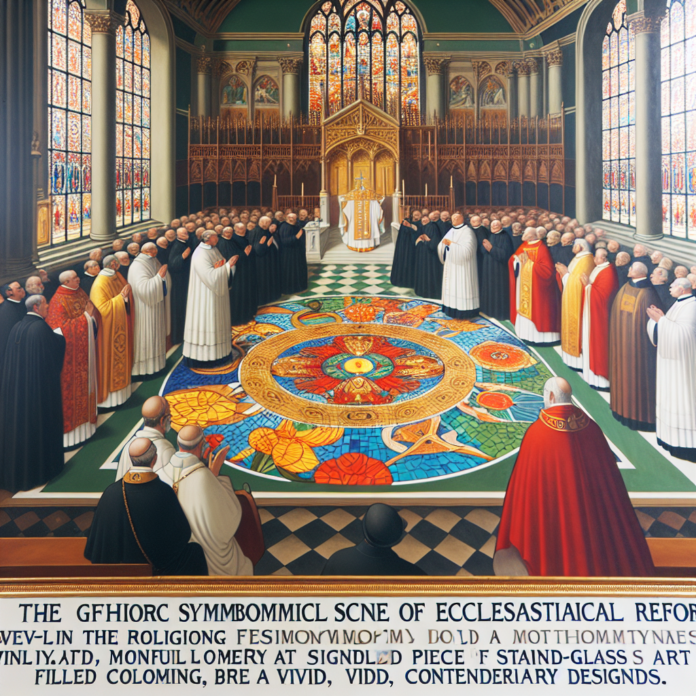Pope Francis Unveils Key Reforms at Historic Synod, Emphasizing Inclusivity and Modernization in the Catholic Church
In a historic move that echoes through the halls of the Vatican and the hearts of more than one billion Catholics worldwide, Pope Francis has unveiled a series of groundbreaking reforms aimed at promoting inclusivity and modernization within the Catholic Church. The announcement came during an extraordinary Synod held at the Vatican, marking a momentous chapter in the Church’s two-millennium history.
The Synod, officially known as the Synod on Synodality, convened with a clear mission: to redefine the contours of the Church in the contemporary world, addressing both the enduring traditions and emerging challenges of a rapidly changing global landscape. This gathering, widely anticipated for its potential to reshape Catholic doctrines and practices, received input from clergy and laity alike, reflecting Pope Francis’s commitment to a more participatory and inclusive decision-making process.
A Vision of Inclusivity
Central to the reforms unveiled by Pope Francis is a profound emphasis on inclusivity, aimed at bridging gaps and healing divisions within the global Catholic community. "The Church must open its doors wide, as a symbol of God’s unconditional love," declared Pope Francis in his opening address. His words underscored a mission to reach out to marginalized groups, including women, the LGBTQ community, and people who had previously felt alienated by traditional dogmas.
One of the most significant changes is the proposal to formally recognize and increase the roles that women play in the Church. While women have long served in vital capacities, their voices have often been underrepresented in the hierarchical structure. Pope Francis has called for a reevaluation of the roles women can hold, potentially allowing for greater participation in liturgical functions and governance. Though not explicitly endorsing female ordination, this move is seen as a remarkable step towards achieving gender equity in Church roles.
Further reflecting the Pope’s inclusive agenda, the Synod also addressed the Church’s stance on LGBTQ issues. Departing from policies that many have considered exclusionary, the new reforms advocate for a pastoral approach grounded in compassion, focusing on the human dignity of LGBTQ individuals. "Our mission is not to judge, but to accompany and love all God’s children without exception," emphasized a statement issued by the Vatican following the Papal address.
Modernizing the Church
In addition to fostering inclusivity, Pope Francis’s reforms set a clear path for modernization, focusing on making the Church more adaptable and relevant in the contemporary world. This strategy includes utilizing digital platforms for evangelization, embracing environmental stewardship, and encouraging interfaith dialogue.
At the Synod, a significant emphasis was placed on the Church’s environmental responsibilities, a recurrent theme of Francis’s papacy. With the release of his second encyclical, Laudato Si’, the Pope urged all Catholics to cultivate a deeper ecological consciousness. The new reforms intensify this call, encouraging dioceses worldwide to adopt sustainable practices and lead initiatives to combat climate change, inspired by the belief that care for our common home is a spiritual duty.
Moreover, acknowledging the importance of technology in modern life, Pope Francis has advocated for a more robust presence of the Church in digital spaces. This initiative looks to harness social media and other digital tools to spread the Gospel and engage with a younger, tech-savvy population. The Vatican has signaled its intention to create platforms that foster global Catholic communities online, sharing resources and dialogue across continents.
A New Chapter in Interfaith Relations
An often understated pillar of modernization proposed by Pope Francis is the deepening of interfaith dialogue. Given the rise of religious pluralism, the Synod has encouraged diocesan leaders to initiate and participate in conversations with other religious traditions. These efforts foster understanding and peace, reflecting the Pope’s vision of a Church that builds bridges rather than walls.
The Synod’s final document, a testament to this transformative approach, outlines initiatives to continue engagements with leaders of other faiths, proposing shared community projects and educational exchanges that celebrate common values and humanitarian goals.
Challenges and Responses
The announcements have been met with mixed reactions, ranging from enthusiastic approval to cautious skepticism among the faithful. Progressive circles within the Church have largely welcomed the reforms, viewing them as long-overdue adjustments that align the Church more closely with modern social attitudes. However, traditionalists have expressed concerns about maintaining doctrinal integrity, warning that rapid changes could risk altering the very foundations of the faith.
In response to such concerns, Pope Francis reiterated that these reforms seek not to dismantle tradition but to enrich it by incorporating a broader spectrum of experience and wisdom. "The Church must be a living, breathing entity," he remarked—an institution that listens, learns, and grows while being steadfast in its essential mission to spread love and faith.
As the dust settles following the Synod’s conclusion, the global Catholic community stands at a crossroads, invited by Pope Francis into a new era of its history. Transitioning these reforms from principle to practice will require patience and continued dialogue, but for many, this moment represents a beacon of hope—a testament to a Church renewing its relevance in the modern world, grounded in a timeless message of love and inclusivity.
While the path forward may hold uncertainties, Pope Francis’s vision remains clear: a Catholic Church that is not only aligned with the Gospel of Christ, but also in dynamic conversation with the world it serves.
